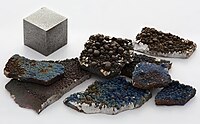
Photo from wikipedia
Abstract During the last decade, it has been shown that the W-containing IRIS-TiAl alloy displays promising properties for structural applications at high temperatures. The manufacturing process of this alloy is… Click to show full abstract
Abstract During the last decade, it has been shown that the W-containing IRIS-TiAl alloy displays promising properties for structural applications at high temperatures. The manufacturing process of this alloy is divided into three successive steps: electrode production, powder atomisation and spark plasma sintering (SPS) densification. However, an IRIS alloy densified by using pre-alloyed powders atomized by EIGA process (Electrode Induction melting Gas Atomisation) has recently been found to exhibit chemical heterogeneities. The aim of the present work is to look for the origin of such heterogeneities all along this manufacturing process. The microstructures and the chemical compositions of the material obtained after these different steps are thus investigated at intermediate and local scales by using various experimental tools. A particular attention is paid to the distribution of tungsten atoms in correlation to the constituent phases. Effects of these heterogeneities on mechanical properties are measured by performing tensile tests at room and high temperatures. It will be demonstrated that these heterogeneities are issued from tungsten segregation occurring during the first stage of the initial solidification of the electrode, thus prior to atomisation.
Journal Title: Materialia
Year Published: 2021
Link to full text (if available)
Share on Social Media: Sign Up to like & get
recommendations!